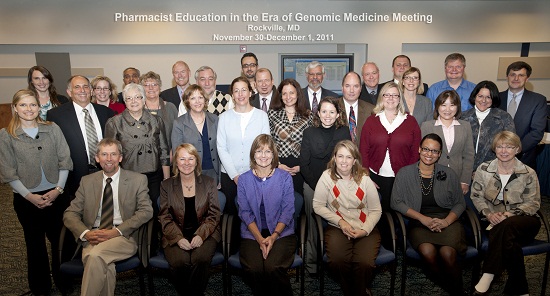Major pharmacy organizations and stakeholders in the genomic education of pharmacists participated in the Pharmacist Education in the Era of Genomic Medicine Meeting held November 30 to December 1, 2011, and sponsored by the National Human Genome Research Institute (NGHRI), National Institutes of Health, and Department of Health and Human Services.
In addition to representatives from the American College of Clinical Pharmacy (ACCP), representatives were present from the Academy of Managed Care Pharmacy, Accreditation Council for Pharmacy Education, American Association of Colleges of Pharmacy, American Association of Pharmaceutical Scientists, American Pharmacists Association, American Society for Clinical Pharmacology & Therapeutics, American Society of Consultant Pharmacists, American Society of Health-System Pharmacists, and National Alliance of State Pharmacy Associations. Also in attendance were representatives from medicine, nursing, and physician assistants as well as the National Coalition for Health Professional Education in Genetics, National Cancer Institute, Centers for Medicare & Medicaid Services, U.S. Food and Drug Administration, and IMS Health.
In view of the recent advances in genomic discoveries, together with the direct-to-consumer marketing of genetic and pharmacogenomic tests available at local drug stores, the meeting was convened to define the current landscape of pharmacist education in genomics; identify core educational needs; and plan next steps to strategically address pharmacy education at various stages of health professional education.
Improved health outcomes from genomic discoveries will only be realized if the health care community is aware of and can translate these findings to clinical practice. In his address, Greg Feero, M.D., Ph.D., Special Advisor to the Director, NHGRI, stated that because pharmacy services exist across the health care funnel from primary care to specialty care, “[p]harmacists are well positioned to ensure maximal societal benefits of genomic discovery.”
ACCP has long recognized the pharmacist’s role in providing individualized medicine. As the human genome project was being developed in the early 1990s, ACCP recognized pharmacogenomics as a factor that would promote change in pharmacist roles and responsibilities1:
Pharmacogenomics—the application of principles of pharmacogenetics to the development of optimal regimens for treatment or prevention of disease—also may result in new pharmacist roles. It is likely that knowledge of a particular patient’s genetic profile will be used in the future to individualize drug selection and dosing, or to predict adverse effects. Pharmacists may be required to assist in the interpretation of diagnostic genetic tests and to use their knowledge of pharmacokinetics and pharmacodynamics to optimize drug therapy for a specific patient. The greater degree of complexity associated with this mode of drug selection may further increase pharmacists’ roles on the patient care team. In addition, one would expect that the evolution of pharmacogenomics will increase the need for patient and health care provider education regarding drug therapy.
In addition, statements on the knowledge and application of pharmacogenomics in designing patient-specific drug therapy plans were delineated in the clinical pharmacist competencies.2 Today, clinical pharmacists assimilate pharmacogenomics into daily practice, and several generate new knowledge paramount to pharmacogenomic research and optimal patient outcomes. Further educational efforts will enhance pharmacists’ knowledge and the application of genomic discoveries in various practice settings.

- American College of Clinical Pharmacy. A vision of pharmacy’s future roles, responsibilities, and manpower needs in the United States. Pharmacotherapy 2000;20:991–1022.
- American College of Clinical Pharmacy. Clinical pharmacist competencies. Pharmacotherapy 2008;28:806–15.